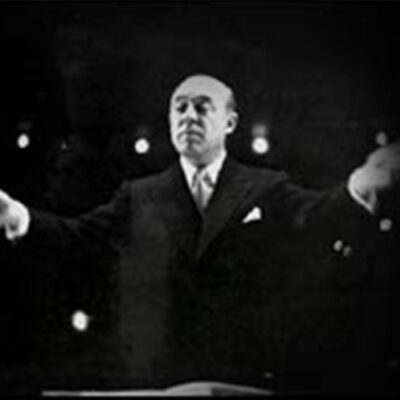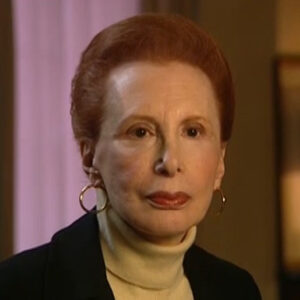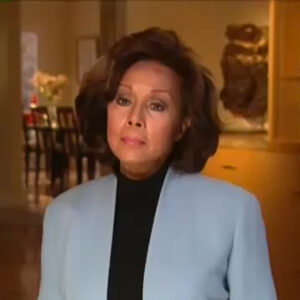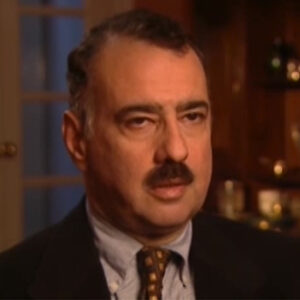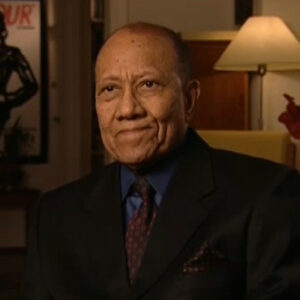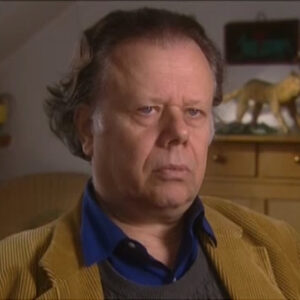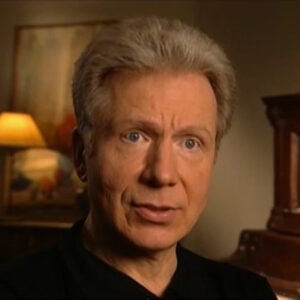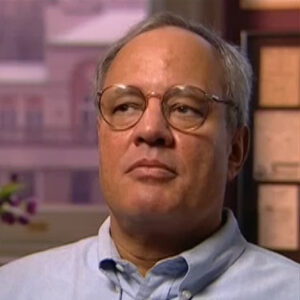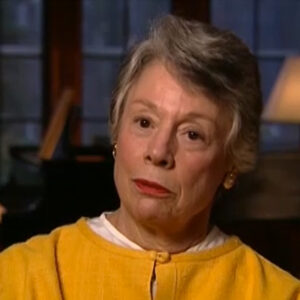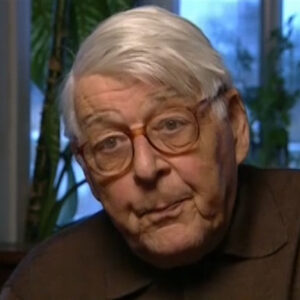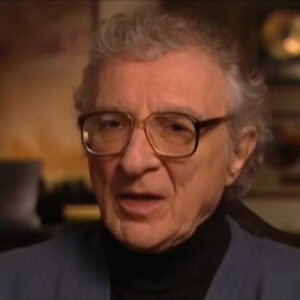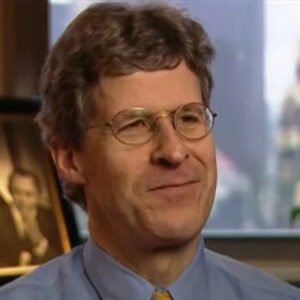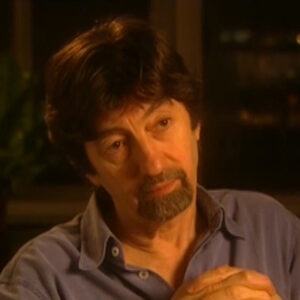Speaker 1 Without collaborating, there really is no theater of any sort, you have to be able to work in my case with a lyric writer, but then the two of you have to work with the director and sometimes the book writer and and sometimes even the producer. It’s as close a thing to a marriage as you can possibly get, I think. And with all the attendant nervous making, shall I tell him I don’t like this lyric or do I tell her I hate her hat? I mean, it’s the same thing. How do you tell somebody that you don’t like the work they’re doing? It’s it’s very tricky. And some people like to work in the same room with each other. I know. Can’t or never do that. Or at least I think they do. Daddy and Larry certainly worked in the same room because there was no other way to do it. When Marshall and I were at once upon a mattress, he went off for long walks and came back with part of a lyric and presented it to me. Lyrics always came first, but there are a million different ways to to do it. But you have to want to do it. And the best collaborations, I think, are always obviously the most long lasting ones.
Speaker 2 Do you have a bracelet? No, no, no. What’s clicking. Nothing. Clicking on your. Was it camouflage? Yes. We got the second movie right. So now we know it’s a roll, please, it’s a collaborative process. Can you talk about whether your father was good at the collaborative process, whether he liked it, whether he hated it, or whether he just wanted to be left alone
Speaker 1 as far as my father was concerned? I think the the process of collaborating was more important to him than almost anything else. And it’s the reason when he wrote No Strings Alone, that he never did it again. He would rather work with somebody who was difficult to work with. And God knows he had his fill of that with Larry Hart then then not have somebody to bounce ideas off of. It was part of the element of theater. He loved the best. He loved all of those things that not just the writing but but the casting and rehearsals and greasy spoon restaurants. I mean, it was all one wonderful game for him. He loved all of it. The sound was the pleasantest thing in my childhood. It was adorable. For one thing, Daddy wrote at home with the doors open and he didn’t care who heard as long as somebody wasn’t going by singing or disturbing him in some way or other. But it was so joyful, particularly in the early years. And a few weeks ago, I was driving to the country and my husband and I were listening to Babes in Arms, which had been done at encores, and I filled me with enormous sadness because I realized how young he was when he wrote that and how full of mischievousness and and naughtiness and excitement and playfulness he was in those days and how much I missed versus nobody writes verses anymore. They were such odd, audacious harmonic changes in what he did in those days. And I thought, oh, God, I wish I had somehow managed to communicate that to him when he was alive, which of course, I never managed to do.
Speaker 2 You just did. I’m sure you heard you. Well, let’s you know, I want to just jump around topics and follow where you’re going. Talk about his writing style, then in with with heart and and what was so special about it for you.
Speaker 1 The style with Larry was so different from the style with Oscar, and I can only assume that if he had ever come across a lyric writer with whom he matched up as well as he did with those two, he probably would have written, again, a different kind of music that there was was just to who the hell cares quality when he when he wrote with Larry, whereas with with Oscar, as we all called him, it was a much more serious. Effort, you could feel, I suppose you could even imagine that he was maturing as a musician, as as a human being, and the humor, the craziness of the things he did harmonically in the early Hart days weren’t really there the way they were in the early work. It was a much more contemplative and elongated form of writing. I don’t know if this is making any sense at all, but the minute you get into something like the bench scene in Carousel, you’re writing as well. I guess I hate the word operetta, but you’re getting as close to opera as as you can possibly get and certainly closer than anybody ever got before. Oscars lyrics came first. So he responded to that. He was a remarkably responsive fellow.
Speaker 2 It almost you know, we all know that the musical was never the same after Oklahoma, but it almost sounds like you miss something that maybe something was lost.
Speaker 1 The work he did with Larry, I guess I love because because of its mischievousness and its cavalier craziness, I equally adored what he did with Oscar. But I think what I keep what’s making me say these things about the difference is that the man was changing while the music was changing and his life got for my money, progressively less fun for him. So there was a different attitude as as he got older, it was it was, God knows, eloquent writing and deep and Bramson and Rich and all the things that that people love about his writing. But it wasn’t Naughtie.
Speaker 2 I guess at the beginning, he was sort of working against the status quo and coming up and then he became the status quo. They became the most famous writers. Of the century,
Speaker 1 I don’t think the the fame struck either one of them. They weren’t paying a lot of attention to that and only names.
Speaker 2 Say that again.
Speaker 1 I don’t think when Daddy was working with Oscar, although they they enjoyed an awful lot of good notoriety right after Oklahoma. They never chose a project because it was going to be groundbreaking. They didn’t think in terms of groundbreaking. And if they’d been trying to do that, it probably wouldn’t have turned out very well. They simply looked for really good romantic stories, exciting stories. There’s just been a film version of South Pacific that reminded me all over again how what an incredible story that was and still is.
Speaker 2 Well, excuse me for playing devil’s advocate, but if they weren’t looking to change, then how come from hard all the way through Hammerstein and beyond? Almost every musical has is filled with innovations.
Speaker 1 I think innovation is probably simply the result of. Extreme creativity, you simply do what feels right and you don’t worry about whether it’s innovative or not, and then you look back and realize that it was innovative when he wrote a tune like, Oh, what a beautiful morning or some enchanted evening where where it goes up instead of down. And I would sing for you, but you would hate it. But but it’s an unexpected place to go musically. No, he wasn’t sitting there with a pad saying what I learned at Juilliard was that if you do this, you should then do that or whatever it was, he just simply did instinctively what felt right to him. And then people would say, what an unusual note or what? What. That’s what makes Richard Rodgers because he went a place you didn’t expect him to go melodically and harmonically. And the minute it was done, it seemed so much more right than any other choice could have been.
Speaker 2 Do you think he surprised himself?
Speaker 1 I don’t think he ever thought about whether he was being innovative or surprising to seemed absolutely right to him. He was a very instinctive writer. Steve Sondheim, when we were both kids, asked him, asked me actually if I could arrange a little meeting with Daddy because he was a great admirer of his writing and wanted to find out how he did that. And after the meeting, Steve pronounced it a total failure. It turns out that Daddy didn’t seem to know why he’d done what he’d done. And Steve, who was a brilliant writer, is nevertheless a more intellectual one. And he knows why he’s doing what he’s doing ahead of time. And he was so frustrated because daddy couldn’t he could explain it musically and justify it, but he had never planned it.
Speaker 2 Is there a specific moment in that conversation that he gave you an example?
Speaker 1 I wasn’t at the conversation that he had with Steve, so I have no idea what they talked about, really. I just know that that he was probably rather matter of fact and sort of. You’re asking me things I don’t know how to answer your reaction.
Speaker 2 OK, let’s stop a second. I have a little. What were the rules of the House if your father was playing and anybody can be around? What were the rules of the house?
Speaker 1 The rules in the House were very simple. Your father is working, you can wander on, but I don’t sing whistle disturb him. As a matter of fact, at one point when I was very little, I was watching him play the piano or write I’m not sure which he was doing. And all of a sudden an ivory flew off in those days where there were real ivory keys on the Steinway and it slipped off and needed glue, obviously. And I wanted to tell him and he was furious. It was like, that’s, you know, I’m busy. Can’t you see I’m busy? And then he was very apologetic when I explained later that a piece of the piano had fallen on the floor, but that I didn’t know that there were a lot of rules that had nothing to do with my father’s writing. They had to do with my mother and when to go to bed and when to get up and what to wear and how to keep my room neat and how not to annoy my father. He very much didn’t want to be bothered with any of the domestic aspects of the household. He couldn’t. First of all, this was in the 30s and the 40s that we were growing up and and fathers were not expected to take that kind of role in those days. And then aside from that, he was a very special man and he dumped it all on my mother. So she was the villain.
Speaker 2 What did she say?
Speaker 1 She did not complain about being made into the chief policeman of the house, but we were all aware of it. It was the typical thing where the father comes home and and the mother says, guess what? Mary did today? And Mary did a lot. I was a very, very rebellious little kid and there was no shutting me up.
Speaker 2 And so what about discipline was an equal was a chair. Did he care or was he involved?
Speaker 1 My father’s dad out of discipline all together until one day when I was seven and I got up really early because I’d never been allowed to play with matches and I managed to get some not play with matches, but even strike a match. So I lit up the curtains in my bedroom and fortunately my father came in and pulled them down and stamped them out because it turned into a much larger conflagration than I had had in mind. I had no idea what was going to happen. And at the end of the school day, my mother said, Your father would like to see you please in the study. And I thought, here we go. Let’s see what of it? I get a spanking or they’ll take my allowance away or they’ll send me to bed early. And he did the most amazing thing. He said, do you see these hands? I said, yes. And he said, these are the hands that play the base of chopsticks. When you play the top, these are the hands that hold yours at lunch when we’re feeling affectionate. And these are the hands that put out the fire you lit this morning. And I remember thinking, oh, thank God, I’m just getting a lecture. He’s not going to spank me. I’m not going to lose my allowance. It’s awful. How can children are? I knew exactly what he was doing and at the same time, it was extremely effective. He’d never given me a lecture like that before. I mean, I knew what he was doing, but it had its effect anyway.
Speaker 2 Amazing. What about lying under the piano while he’s playing or sitting in his lap or tell me about, you know, cleanliness or
Speaker 1 there wasn’t a lot of cuddliness. He was a he was a big hugger. He was very glad to see you when you first came in. And you’ve got a big, heavy squeeze. But there was there was no there wasn’t a lot of physical affection in the family at all. A lot of humor.
Speaker 2 For instance.
Speaker 1 He loved wordplay, he was it was a brilliant person with language, I learned a great deal of what I know now, if it’s anything from him, in fact, I would say almost all of it, even down to punctuation. He he he loved puns. He loved plays on words. He loved jokes. He loved jokes so much that I tense up every time anybody is about to tell one, because I’m so afraid I won’t get it. Because being the at the receptive end of humor was quite terrifying. If you were simply too young to get it, you felt like a jerk.
Speaker 2 Well, what was he, a kind man or did he make fun of you? When you talk about humor and being intercepted and being scared?
Speaker 1 Was he a kind man?
Speaker 2 I say it that way.
Speaker 1 My daddy was a very. Complicated and difficult person, I was always afraid of him, not for the app, not obviously because I was going to be beaten, but he he he could be very acerbic and very critical and he could do it with one word. And I imagine people in the theater will remember that, too, although I think at home he felt freer to to be impatient when he felt it. He was he was awfully he was really very preoccupied with what he was doing, and the impression I often had was either behave yourself and perform or don’t get in my way, which doesn’t sound very charitable, but I never I somehow always understood who he was and why he was.
Speaker 2 Your mother in her book writes, you know, it’s sort of the famous quote about who’s who’s the who’s first who’s most important. Could you tell us that? And but don’t say it about the book.
Speaker 1 I remember often asking my mother, who who do you love more us, meaning me and Linda or Daddy? And she said, well, that’s a ridiculous question. I mean, I love you very differently. But when push comes to shove, which was not the term she used, there was no question about where her loyalties were. And they were a very concretized collaboration themselves. I can’t speak for Linda, but I think she’d probably agree that we often felt locked out.
Speaker 2 And what about his loyalties? There’s also in the book where Aaron. Your mother basically admits what is most important for your father.
Speaker 1 My mother. Cared more about what was important for him, surely, than she did about what was important for us. That’s part of the time that she lived in and part of her own personality because she was a perfectionist. And I was a constant source of irritation because I certainly wasn’t. And it was the world pretty much revolved around him. She was the chatelain of all she well had control over, which was quite a lot, and he expected it ever. He wanted her to be a brilliant hostess, which he was. And but he never did the thinking. She had to do the thinking like who was coming for dinner and what they were eating for dinner and which schools we should go to and what time our bedtimes were and things like that. She was in charge of all of that.
Speaker 2 Let’s talk about his writing and whether he was secretive open. Did he play things for you or did I mean, what what was that like? Here he is writing what we now know as some of the greatest music of the 20th century.
Speaker 1 I would hear him playing and. Loving it, the only boring part was when he was making a manuscript, when he played the same stuff over and over and over again in order to get it down on paper. But there was sort of a performance moment when especially I remember this the in the Hammerstein days, I don’t remember the Hart days, but in the Hammerstein days, he would drop a lyric up on the piano. He would then play the accompaniment and whistle the tune so that you could lean over his shoulder and read the words and hear the tune because he was whistling it. And then, of course, he had the use of all 10 fingers instead of wasting one or two of them on the melody. And there was a sort of a performance. It would be after dinner or at a particular time when he was excited about doing something.
Speaker 2 And did he want your approval? Did you just clap, cheer? What was the family doing?
Speaker 1 I don’t think there’s anybody who doesn’t want approval and expect and hope to get it. And I I’m not a very good liar. So if I heard something that I didn’t like, I probably wasn’t able to conceal it very well. Wasn’t that I ever didn’t like something, it was that I thought some things were better than others, which was the way my mother used to handle it. She’d say, Oh, darling, that’s just lovely. I actually it’s it’s almost as wonderful as that one you did yesterday, sort of. And you have you have to be very tactful with writers.
Speaker 2 You can dance
Speaker 1 dads. You have to be especially tactful with if you want your next meal. Well, what
Speaker 2 OK, when did you realize how old were you when you realized that your father was Richard Rodgers?
Speaker 1 I don’t think the full effect of who he was struck me until I got to college because I went to a school where everybody was the child of famous people, and I also had the misfortune of going to school with the Berlin daughters. And I came home one day and said to my mother, who’s more famous, daddy, or Irving Berlin, and she said, I hate to tell you this, but it’s Irving Berlin. Then Oklahoma opened and we were having an air raid drill during the war and everybody was singing Oklahoma because it just had just opened was a big hit. So I went home in triumph and said, well, guess what happened today? So it’s interesting because we’re all very good friends now with, you know, the Berlin girls and the Rogers girls are very friendly.
Speaker 2 Do you remember the first show you were brought to, the first opening, what it was? And describe the scene for us.
Speaker 1 The first opening I ever went to was Carousel because I was very strictly brought up and it wasn’t appropriate for children to be opening night. So I didn’t even get to the opening night of Oklahoma. The first show I ever saw was was Jumbo, which Daddy wrote with Larry when I was four and I adored. It was Jimmy Durante stealing elephants and an incredible score. And I remember thinking this was just the most dazzling thing that had ever happened in my life, as I always felt. We went to the to the first matinee after the show it opened. And but I, I was not until I got to college really aware of who that that Rodgers and Hammerstein were something. And that’s probably just as well. At one point when when I was about nine or 10, he took me backstage after the matinee, which he always did, and to to curtsy to the stars and meet everybody. And and when we got we went out the stage door and somebody came up to him and said, oh, Mr. Rogers, could I please have your autograph? And I said, Oh, I don’t know why you bother. He has just awful handwriting and he won’t be able to read it anyway. And he gave me this filthy look. I never could read his handwriting to this day. If you presented me with something he wrote, I wouldn’t be able to read it.
Speaker 2 So you wrote music? I didn’t have to write, yeah.
Speaker 1 Or I had somebody to type it up for it.
Speaker 2 Let’s stop for one second. There’s one errant hair on this side.
Speaker 1 Get me unpunched my unpunched.
Speaker 2 Yes, you have is however one here.
Speaker 1 Just another one hair. The same
Speaker 2 one.
Speaker 1 So does anybody give a shit.
Speaker 2 Your father was so creative. Was he creative in other ways. Can you talk about that besides music and theater.
Speaker 1 He was creative daddy with language which most people don’t give him credit for because even the book he wrote, musical stages, although articulate, isn’t very revealing because he was basically a very reticent person who didn’t like to talk about himself or emotions very much at all. He was extremely good with language. Otherwise, I don’t think he was remotely creative. He didn’t care what he wore. He didn’t. He began to care about paintings because my mother taught him. She made him she just dragged him around to museums until he developed a very good eye. But he had no hobbies. He played croquet for entertainment, the English croquet with the heavy mallets and all that stuff. But he didn’t like traveling. He loved going to the theater primarily to his own shows. He would stand in the back and enjoy people enjoying them. I didn’t read an awful lot. He had I mean, his fun was theater, any aspect of theater, because all of that seemed creative to him. And otherwise, no, I wouldn’t say he was creative at all.
Speaker 2 Would you sit with you in the theater where you go for the first time? Would you pace up and down? What do you say? See you later. I’m too nervous. Smoke cigarettes the whole time.
Speaker 1 I can’t remember if he sat well, yes. I think he sat with us in the theater and he wasn’t a bit nervous. The whole thing had already opened and it was, it was what it was. And I think he probably wanted it wanted to have the fun of watching us, liking it. Of course, I get all the early Larry Hart Rogers things mixed up because I was always bored with the book. I realize now I probably had very good taste because everybody was bored with the books, but I would just wait from song to song. And so to this day, I can’t tell you half the time what song comes from what know, because none of it made a great deal of sense anyway. It was just these great tunes and wonderful performers. But I don’t I don’t think he worried when we were little about what we thought about what he did when I got older. I think he did. But that’s my one real regret about our relationship, that the fact that I never, never managed to communicate to him, partly because I hadn’t realized it myself before he died, but also because he was. A hard person for me to communicate with how much I adored what he did and that I didn’t even really care what kind of a father he was or what kind of a person he was. Because of what I knew was was lurking in there, I just adored what he did. So it’s been a great joy for me to to continue to get to know the stuff better and more. I mean, I know much more about what he wrote now than I did before he died.
Speaker 2 Oh, yes. OK, let’s go way back before you tell us about growing up in Mount Morris Park and by name and where it is, if you could, in Manhattan, you know, not the street, but just way up there. You want to see the street? We can do whatever she wants.
Speaker 1 I don’t know. The street. What street was it
Speaker 2 looking like where she was born? I thought it was wasn’t the one. I’m going up there one way out of northern Manhattan. But the question is, what was the atmosphere of his home growing up and what was his solace?
Speaker 1 I wonder how the hell my father, I grew up at all, actually was, I suspect, a very dysfunctional family. He lived in a in a brownstone, an upper Manhattan near something called Mount Morris Park, which I think has been renamed now around the corner. Curiously enough, from where Larry Hart grew up with his family was a nice Middle-Class Jewish family. My grandfather was a doctor, but my grandfather didn’t talk to, I don’t know, my mother’s my father’s mother’s brother on the other side. Nobody talked to anybody as far as I could make out. My grandmother was a terribly frightened, easily intimidated little person who didn’t have the guts to walk to the corner without her mother. My grandfather, who was always adorable to me, had apparently an absolutely terrible temper. My Uncle Morty, the obstetrician who was five years older than Daddy, was pretty rough on him because he daddy was clearly the favorite. He was the golden boy who played the piano. And my grandmother adored him. And he could he was always obviously a very amenable, agreeable person, although he was probably not necessarily feeling those feelings. He learned that as many second children do, that you’re better off behaving like that. I think he grew up with with a lot of fear and anxiety, and that’s part of what you use when you’re a writer. I’m sure Daddy’s joy as a child was what it was as a grownup going to the theater, which his parents took him to all the time. Otherwise, I don’t imagine he had a lot of fun. I don’t know much about it. You know, I never asked him. In fact, I never knew anything about our family until a very distant cousin called Hannah Harris, who was, I think, a schoolteacher. I sense that she was getting on a bit. She was probably 50, but I thought she was very old and about to die any minute. And I said, come over for tea and tell me all about the family, which is where I found out what his original name had been and all of those things that I knew nothing about and nobody else knew anything that he really didn’t talk much about, about his childhood. The one thing I ever heard and heard often because I asked him was how come he had this strange scar on his index finger that went all the way across his nail and down the other side. And I kept saying over and over again, what is that? What does that? I think I used to ask him questions all the time just to make sure he’d talk to me, even if I’d heard it before. So but it turned out that that was a little case of osteomyelitis that he had contracted somehow or other in my grandfather. The doctor operated on his finger at the kitchen table because it was clearly an emergency. And he he apparently was very traumatized by that experience because he couldn’t understand how his father could hurt him that much. But it’s one of the few things I know about his childhood. Oh, yes. He also ran away once because Uncle Morty was so mean to him, his brother. I don’t think he ran very far because I didn’t hear about the police finding him or anything. He probably went to the corner with his own mother, was afraid to do so.
Speaker 2 He says in his autobiography that that he went to the piano.
Speaker 1 I’m sure he went to the piano because he was good at it. And my grandmother had a very good ear and played by ear. And I think that’s clearly the genetic line of when it all came. But it sounds right that he would have gone to the piano. I was he wasn’t there. But I think for all creative people, it’s the way they make themselves feel better. It’s not that creative people are neurotic. It’s that a lot of people are neurotic. But if they’re lucky enough to be creative, that’s what produces serotonin. For them, it’s the Prozac. And I shudder to think what might have happened if all the brilliant composers in past centuries had had been swallowing Prozac, because I don’t think there would have been the need to find an outlet that they were lucky enough to be creative about. If that makes any sense.
Speaker 2 That’s amazing. I never heard. That’s fantastic. You’re probably right. Let’s get rid of all of that. We should be unhappy. Right.
Speaker 1 But I’ve talked to to our son Adam a lot about this whole element of happy and unhappy and creativity. And it’s interesting because I am the first person to out myself when I’ve done so many times that I take Prozac. Very interesting that since I’ve been on Prozac, I’ve had no particular urge to write. I don’t remember ever having an urge to write because I was so frightened of failure that I had to make myself. But once I got started, I adored it the way everybody else who writes the doors it. And after that, I mean, I’ve been very contented and happy with the Juilliard work and the Rodgers and Hammerstein work. And I don’t know if there’s a connection or not, but I know that when I was writing music, it was the only time in my life when I felt utterly, totally self-sufficient in the healthiest possible way. Nobody could hurt me. Nothing could put me down. It was I was in a box of euphoric isolation. I can only assume that that’s what happens to all composers, more so composers than writers, because prose goes through a second medium goes through the medium of your mind, the language. You have much more freedom musically and you get an immediate emotional reaction to what you’re hearing in your head or what you’re playing on the piano, which propels you into making the next set. So of course, Daddy would go to the piano,
Speaker 2 let’s go back to Mount Morris Park and talk about Broadway. And if there was music in the home and what was being coming home and what he was exposed to as a young child,
Speaker 1 I really don’t know anything about that. Fine.
Speaker 2 We won’t talk about that.
Speaker 1 I assume they were whatever was the going popular stuff was.
Speaker 2 Yeah, OK, OK, you you’re just, um. You’re talking about dealing with your demons.
Speaker 1 Yes, a
Speaker 2 very real sense, yeah, we know that Larry dealt with his demons by drinking. What was your father’s demons and how did he do that?
Speaker 1 He had many demons, not the least of which were silly things or silly if you don’t have them, like being afraid of heights. I don’t know how my mother ever got him to move to the 18th floor of the hotel. He was afraid of tunnels. He was afraid of planes. He didn’t like loud noises. And he had a drinking problem, which was a very well kept secret for many years because he was a he was not your he wasn’t your falling down alcoholic. He first of all, I don’t think he drank when he was writing because he was happy writing. And you don’t really start drinking it unless you’re really in bad trouble. Ray Milland, kind of alcoholic. You don’t start at 9:00 in the morning, which was usually when he was at the piano. He was an early riser and stuff. But and I think his close, close friends knew that he he drank, but I never knew it till I was 25 years old. He wasn’t that kind of dependent, but he was very fearful about health. When he finally got cancer of the jaw, I think he was relieved because he’d been waiting for something terrible to happen for so long. When it finally happened, it was like, oh, well, now I’ve got that over with. And he was always rather curiously happy when he was in the hospital being taken care of of which is one of the reasons I think he and my mother had such a successful marriage. She was a great caretaker and wanted to be he was deeply neurotic, deeply and very unhappy unless he was writing, which is why as he got older, I think, and after Oscar died and he failed to find somebody who was truly compatible for him to work with, he kept doing it anyway. People always say about composers or writers as they get older, well, why don’t they just rest on their laurels? They have all the money and why do they have to bother? It’s because that’s the only way you can be happy. He would have set the telephone book if somebody hadn’t come up with something else. He wanted that theater experience and he wanted that serotonin sensation.
Speaker 2 Maybe it’s not demons, but it’s its relationship. How do you think he survived the relationship with Larry Hart, given that Larry was so problematical at times? How did you deal with it?
Speaker 1 I think dealing with Larry was the way you deal with any difficult marriage. If you love the person enough, you’ll put up with an awful lot until it becomes absolutely nonfunctional, which finally it did with Larry. But he was a lovely guy, Larry. Larry didn’t have a mean bone in his body. He was actually a much nicer man than Daddy was. My daddy could get off some really mean cracks. Larry never did that. He was adorable and and fun loving and played practical jokes on people. And he was irresponsible and and bad, which, of course, is what shows up in the music. He just would lock them in a room and say, here’s the tune. And he kept playing the tune til Larry came up with something which didn’t actually take that long. He was a very quick writer, as a matter of fact. But you put up with it because it’s the work is wonderful. Why wouldn’t you? I mean, you’re going to say, I’m sorry, I don’t like how much you drink and you’re like, sometimes I can’t get you on the phone, so I’ll go find somebody else to write with. His collaboration was the most important thing in the world to him.
Speaker 2 Tell us when you were a kid, what you call Larry. Well, what was it like to be in the house with him? And how did you know he was there?
Speaker 1 Well, we always knew that Larry was in the house because you could smell him a mile off. He smoked more cigars in the stretch of a day. I don’t know why he didn’t die of lung cancer, but other than that, he would laugh and he was there. He was a presence. He was an enormous short little hurricane. He had a terrible, phlegmy cough that came from all that tobacco stuff. And he when he left, he’d sort of go rub his hands together, which Linda used to imitate was terribly funny, much of my mother’s horror. And he loved being imitated. He thought it was wonderful. I always thought he was or for many years I thought he was younger than Daddy because he was shorter and as a child, the short people or the younger people. But he never came to the house without bringing a present for everybody. He he was a great joy. You know,
Speaker 2 when we first met, you described him as a child and there were some metaphore about that. Do you remember that? Can you can you talk about that?
Speaker 1 I think Larry was basically child like that on the surface. Not underneath. Underneath Larry was, as we know from his lyrics, but we also know from the way he handled his life, deeply sad, never malevolent, just sad.
Speaker 2 Let’s stop for one second. I want to. OK, so if you can tell us that cute little story.
Speaker 1 There’s a cute little not so cute little story about a point when Larry was so drunk and out of condition that that he really needed to be hospitalized. And Daddy said to him, check into I forget where somewhere in Manhattan, a discreet place, I’m sure, and I’ll check in with you. And and he did. And he got a piano sent over and they work there. Now, that sounds wonderfully humane. It was humane, but it was also extremely practical because that was the only way that he was going to get any work out of him and he knew that. So work is what drives those things.
Speaker 2 Good, when Larry started to decline more and more, there’s we’ve read or heard that he actually approached IRA Gershwin in the 40s as a possible collaborator.
Speaker 1 Not you don’t know that. I don’t know about it.
Speaker 2 OK.
Speaker 1 Can you tell I do know that when Larry got really bad, he he had known Oscar at Columbia, they’d all known each other, although daddy was seven years younger than both of them, they were, oddly enough, the same age. And he went to speak to me about the problems he was having with Larry and how he didn’t know what to do about it. And Oscar said, well, you can’t and not continue to work with him clearly until it’s completely impossible. You have to do your best, which he felt, too. But if there’s ever a time when you need me, I’ll be there, which was, I guess, a comforting notion and came all too soon.
Speaker 2 Talk. Can you talk about the months leading up to Hart’s death and what are your memories of that period and what effect it had on your.
Speaker 1 I don’t remember much about Larry’s final months, I heard about it from my mother and about how he died in the hospital and when there was during a blackout and when the lights came back on, he was gone. I do remember that it was during carrousel, the production of Carousel that had happened. I can only imagine that daddy, who was not a guilt free person, I imagine anyway, who is must have felt responsible and at the same time resentful that he should have to feel. I’m guessing I can’t read into that man’s mind. Never could. But he must have felt guilty and at the same time must have felt that he did the best he could and he couldn’t do anything more. He did, after all, do the revival of Connecticut Yankee with Larry after he had done Oklahoma. So I think he very much wanted Larry to know that if it was possible to work with him, that he would be happy to continue to do that. At the same time, he must have known that it wasn’t looking very possible. He was pretty disorderly in the back of the theater, I gather, several times.
Speaker 2 Oscar Hammerstein, what was that like for your father after the tumultuous relationship with Larry,
Speaker 1 working with Oscar for dad? He must have been a great relief. Its calm seas after a lot of turmoil. I don’t think it was probably as much fun as it was when we’re working with Larry was at its best. It was they they Oscar and Dorothy and Dorothy, my mother and and Dick got along extremely well in a collaborative sense. But they were not close friends, any of them. Daddy and Oscar weren’t close friends. They were as close as you can possibly be, I think, as collaborators. But it was a different kind of marriage. It was respectful. It was, God knows, productive, polite. Not that I know that his marriage to Larry wasn’t polite, but it was a it was a different experience altogether.
Speaker 2 Everybody seems to make a big deal about writing the lyrics first, writing the music first. You know, he wrote music first with Larry. He wrote the music second with with Oscar. Does it really make any difference to such a creative person?
Speaker 1 The interesting thing about Daddy was that I never heard him go to the piano and write if he didn’t have a project, didn’t have something to do. He never just went there to fiddle around and see what he came up with. I can only assume from that that he was very project oriented, always. He never, for instance, played music in the house, almost never, which surprises people. But I had to learn how to deal with this incredible thing called a Capehart, which put you take the 78 record, a whole pile, and you put them in and then the machine turns them over when they’re ready to be turned over. Except the machine usually broke them, as far as I can remember. But he he rarely played music of any sort and the radio wasn’t on, had he. He was working for the theater. He was not interested in abstract music and writing it. He wrote very few, you know, a couple of ballets and victory at sea and things like that. But basically he loved the whole theater thing. I can only assume from that that when presented with a lyric by Oscar, having already discussed quite thoroughly with him what the scene was, what led up to the song, who was singing the song? Probably what rhythm the song was, certainly what mood the audience was to to get from that song that he was more responsive to that way of working than he would have been the other way around. But that’s again, it’s just a guess.
Speaker 2 Sure. Tell us your memories of of Oklahoma, what was going on? Was there tension as your father before an opening? Is he pacing more, smoking three cigarettes at a time? You know what happens before and give it to us around Oklahoma, if you could.
Speaker 1 Oklahoma was unique in that it was not only a very peculiar project. Green, grow the lilacs, please. I mean, that was not the kind of musical anybody ever did. And the. The backers have exactly the same impression, and they did many, many, many auditions and had a hard time raising money with the Theater Guild. I don’t remember his being acting more nervously than he than he did before he was. He always smoked three packs of cigarettes a day, whether he was nervous or not. But. I think once they started working, which he did, by the way, after studying classical piano again, he started taking piano lessons when we were living in Fairfield, Connecticut, for a year during the war with a man called Hermann Wasserman. And as Linda and I thought he was out of his mind to be going out of his way to practice and play the piano. But in fact, I think it had an enormous effect on what he was writing because it opened his memory up to all the serious listening he had done as a child and as a music student at Columbia and at Juilliard. And it explains, I think, the rich, expansive and non frivolous stuff that he began to write with with Oskar in Oklahoma was the beginning of all that. It was obviously a much more nervous moment from my parents than my sister. And I realized they weren’t going to tell us that they were worried about running out of money, which they sort of always were. They lived right up to the to the height of what they had. And neither of them came from families with enough money to be able to afford year after year after year of flops. Not that he’d experienced that, but there was a lot at stake here with a new collaborator and everything else. And he had a pretty large household to take care of. It was not just me and my sister and our nanny and the maids and the Cox and the whatever. But there was also an English child who was my English sister, really, who came over during the war and lived with us and her nanny. So he had quite a few financial responsibilities to be concerned with. The day after the following morning after Oklahoma opened, my parents were in a great state of jubilation in the newspapers because then there were a lot of them were all over the beds and they were in a great mood and told us we could go horseback riding, which was very expensive thing to do in New York then and probably still is. So we realized something good must have happened. The only thing I really remember, the only tune I remember falling madly in love with before the show, before I saw the show, was many in New Day, which for some reason or other, again, it was it was mischievous, that little trail that it was. It just delighted me. The whole show delighted me. There was no way not to like Oklahoma
Speaker 2 very shortly thereafter, just a couple of months. They do a revival of Connecticut Yankee. It’s another hit. He’s got two hits now on Broadway with his two collaborators. Well, maybe Hammerstein isn’t a full collaborator collaborator. He’s going to be yet, but he’s got a writing partner. Was there ever any talk, any moment, any about two hits? Two different writers. Roger’s on Broadway
Speaker 1 I never heard about. I never heard about having Connecticut Yankee in Oklahoma on at the same time, I have a feeling that if I didn’t, part of it was because Larry was already so sick that that it was like the end of one era and the beginning of another.
Speaker 2 Talk about your father being a producer, being, you know, starring in the Rodgers and Hammerstein organization, not just being a composer anymore. Tell us that he does that and and what that brings to him, what joy it gives him, what pains it gives him. And does he change his music change because he’s got to be a business man?
Speaker 1 He became a producer, I think with the experience of the original. I remember Mama and I can’t imagine why he did that, except that it was probably, again, another theater experience and fun. And that was the only thing he knew that he loved was was theater. He then, of course, he and Oscar were very canny about realizing that instead of having other people raise the money and take all the profits, that they were now successful enough to be able to call the shots. And and they were both extremely savvy about about how to do a show by then. So they kept their work together and they, you know, on a 50 50 arrangement and like, they hung on to those copyrights and they hung on to those properties. And that’s one of the reasons. You’re filming in this lovely apartment. Yes, he hung on to the stuff he didn’t care about money at all. He cared not a bit. My mother was like a double entry bookkeeper. She really knew about money. And I’m sure she was the cautionary person who would say they’ll think we should do this and I think we should do that. His only interest in money itself, what was that when it involved his own shows? It was when he was making a lot of it. It was an indication that an awful lot of people liked what he was doing, but he was not really interested in things or ostentatious living. He just wanted to be comfortable.
Speaker 2 Can you talk about sorry to keep bouncing around here, um, Oscar rewriting the verse of love, look away from our times and
Speaker 1 tell us that story. One of the interesting collaborative things is the business of telling somebody that you don’t particularly like what they did. It’s very hard to do no matter how long you’ve been working with somebody. It’s very hard to say. I don’t like what you have on your face today or I don’t like what’s coming out of your hands today. And I’m I was never in a room, obviously, when he and I were working together. But there was one instance with Love Look Away and Flower Drum, where apparently Oscar wrote a very long verse, which Daddy said and. I think we have all inferred from what happened that Oscar didn’t particularly like what daddy had done, didn’t know or care what the other to tell him that face to face, and instead simply rewrote the entire lyric so that it was only two lines instead of a much longer verse. And presumably Daddy never knew the difference because it was presented as something that Oscar had decided to do. That’s the it’s the ultimate intact. It’s also probably a rather subtle indication of how careful they had to be of each other’s feelings.
Speaker 2 Precision accuracy task, master control, some of the adjectives people have said about your father and how he wanted everything to be certainly a total, total perfectionist. Does that make him bad? I mean, he’s obviously has a controlling presence. Is that just being creative? What to talk about all those things?
Speaker 1 If you’re extremely talented and in in the position to control what’s happening to your work, you’re bound to be tough, demanding and short winded about it. I mean, you’re not going to spend a long time looking around for how to not hurt somebody’s feelings up on stage when they’re doing something or when somebody’s messing around with your your tune, because that isn’t the way you wrote it. And please do it the way I wrote it, including the dotted notes and things like that. Anybody who doesn’t care is there, doesn’t know any better or is merely sloppy and lazy. And you don’t geniuses are not sloppy and lazy.
Speaker 2 Max Wilk had a great line, you know, he went to Yale and saw all the out of town tryouts and loved the funky, floppy, flabby, you know, plays he loved, plays that were being rewritten. He also said that the plays of Rodgers and Hart that came through were so different from any others because they were almost perfect. They were almost there, he would say. And you can always tell a Rodgers and Hart play because it already hung together so well. But he did say the lobby of the Shubert is covered in blood because of the fights that would go on between producer and director and writer and composer and, you know, stage manager and all these things. But it seemed like your father actually enjoyed the out of town times. Can you talk about that?
Speaker 1 Daddy loved being out of town because it was another part of the glorious adventure of theater and he was not a fighter. He would find other ways to get his own way. Short acerbity, little sentences were a lot more effective than shouting and screaming. We were never allowed to shout and scream in our house. And we weren’t we weren’t supposed to hit each other either. Although I abused that rule many times since my sister was four years younger than I was, and he had other ways of dealing with it. But I think what he adored about the out of town experience was the excitement, the late nights, the rewriting, the coming up with something that and the ruthlessly cutting. They were good professional people cut when that when they need to. They don’t hang on iTunes, no matter how wonderful they are, because they like the sound of them. If they’re not servicing the product, out they go. And he was always very professional about that, as was Oscar. And I think he loved the challenge. It was just and furthermore, it’s what you did in those days. You went to the Shubert, you stayed at the TAFTA aided cases. You then you went to Boston and you stayed at the Ritz with the perfumed elevators. And it was just a great, grand, glorious adventure.
Speaker 2 Did have an effect on your. We’re going to change to one more. One more, one more. Sorry, everybody sit back down and then we’ll take a nice little break. Did being away a lot have an effect on your mother? Can you talk about that?
Speaker 1 I think my mother resented every second of her life that was not spent with Daddy. I think Daddy resented every second of her life that she spent with him when he was working, which is because he had to feel guilty about her. You you go out of town and you’re up late and your wife is sitting in a hotel room waiting for you to come back. He would allow her to come for weekends, but which I’m sure she resented. She wanted to be there all the time, but he wanted to concentrate on what he was doing, which is not at all unusual. In fact, it would be unusual to be any other kind of person as a as a creative writer. So as a creative person. Do I hear a waltz was really a very sad and tough project for everybody involved. It seems so completely logical, time of the Cook had been a wonderful play, Arthur and Steve had worked together. Daddy had always admired Steve’s lyrics tremendously, more than he actually admired his music. But Doug and Steve and God knows, admired what daddy did. But they were to begin with a generation apart easily and from a lot of points of view, not the least of which was that that Daddy’s experiences in the theater had primarily been fiercely heterosexual with all the attendant fun things that went with that. And suddenly he was surrounded by people who led very different lives. And they it wasn’t wasn’t a fun party when they were not working together. And it gradually became not a fun party when they were working together, which is where it really matters. But Daddy was used to going to lunch and, you know, and staying up late and whatever it was that they didn’t do it all together as friends. And I think it just got off on on kind of a bad foot. I think Steve had originally hoped to do the score all himself. And Arthur felt that that Steve wasn’t well-known enough. And for the project, it would be better to have Daddy. And I was, of course, plunked right in the middle of all this because two of these guys were my friends and one was my father. And I was sort of instrumental in helping to get it all together. It was it got to be a progressively worse experiences as out of town went on. And and John Dexter was a very difficult little man and I suspect not a very nice one. He’s not here, so I can say that. But it was just rife with nastiness.
Speaker 2 And.
Speaker 1 And on and I feel it’s only fair to say that that my father was every bit as nasty as Stephen Arthur were. I mean, they were all terrible to each other. But by the end, it was just one of those nightmares they happened in the theatre.
Speaker 2 Do you think that soured his looking for other collaborators to play other.
Speaker 1 Working with so important to daddy that nothing would sour him on looking for another collaborator. I don’t think he would have touched Steven Arthur again with a ten foot pole, nor they daddy. But he wanted to keep working. So, you know, he worked with Marnie John and he worked with Sheldon Harnick. He he as long as he could keep working and obviously he preferred working with somebody than working with himself and that the score for No Strings is as lovely. I mean, the lyrics are good. They’re very good. I’m not sure he would have been able to consistently do that, but he certainly didn’t consistently want to or he would have. It’s a lot easier than than working with strangers is always an adjustment. It’s like Elizabeth Taylor is 19 million marriages. You have to keep making new marriages, all of that. So and adjusting to all of that. So but he was not about to stop. I mean, he was doing I remember mom of months before he died,
Speaker 2 talk about his health and his maladies in the last decade or so and how that might have have affected him in his work as a composer.
Speaker 1 As he got older, he wrote less well, he borrowed more from himself. But I think that’s true of most composers I know you can cite examples like Bach who managed to keep on going forever. Life must have been rather different then, but I think at a certain point you simply are less creative. He also had had a minor stroke. He was certainly drinking less because he was more frightened of dying than he was of not drinking. Only person I know who was labeled an alcoholic who was actually able to cut back his drinking to very little. A couple of glasses of wine and a third one if somebody would sneak it to him, but very little because he was terrified of death. I don’t know anybody who was frightened of dying as he was. So he just wanted it wanted to keep on going. I think he also became profoundly depressed as he got older because the 1974 operation on his throat, which removed his vocal chords, changed the one thing in his life that he enjoyed other than playing theater, which was being funny, is a terribly funny man and very quick. But by the time you do esophageal breathing, which means you’re sucking in a lot of air and burping it back up again, try to make a joke with that liability, there’s no way to do it. And he also was, I think, humiliated by by the scar on his face. I mean, I kissed people on the wrong side of their faces all the time because I was trained not to kiss the logical side, which everyone that is because that’s where the scar was. Now you can barely see that scar. The guy did a brilliant job, but then with the the tracheotomy thing, and he never seemed to be a vain man. But I think I wouldn’t have liked having all those things the matter with me either. He was also very funny about it, I might add. He I picked up the phone once and this voice said, yes, yes, yes. And then it was another and he began to have atherosclerosis or whatever serious artery problems in his legs and his legs hurt a lot. So he couldn’t walk very fast. But he did need to exercise. And by that time they’d moved into the pair and he was either on a walker or leaning on the arm or the nurse or something heading towards the back of the hotel where he was going to go upstairs to the 18th floor, whether he liked it or not. And alongside of him was it was an equally elderly and infirm person with a walker. And he looked at the person, he said, let’s get to the elevator. So, I mean, he he was capable of being really very funny even then, but he had to initiate it in his own time. And most of the time, you can’t do that.
Speaker 2 Can you tick off the surgeries, the stroke that just in you had this year, this year, this year they said this and I’m vamping what Alex was just going to them. Just take a look at whether or not. Got it. List for us all, the all the maladies that you went through and my question is, how did that affect him personally? Did he give up? Did he? I mean, what was his his day to day? Attitude towards life.
Speaker 1 He had a beginning, and I think it was 1955, this massive jaw cancer from smoking too much and drinking too much, followed by, let’s see, what else did he have? He had bladder cancer, which also comes from smoking. I hope everybody’s listening to me. He had a stroke. He had a which didn’t really seem to affect him. Nevertheless, it frightened him. He had constantly had high blood pressure along with low moods. He had let’s see what else. Then he had the big throat operation because it was misdiagnosed for such a long time that by the time they figured out what it was, it was too late, although it didn’t travel anywhere. I mean, that was 1974, I think, and he died in 1979. Nevertheless, that produced all the problems to do with communicating with other people. And a certain number of people were fair-weather friends. I mean, they loved it when he was when they were a jolly successful, entertaining in all senses of the word couple. But it was less fun when he was invalided and she was hovering around trying to make things better and stuff that he had a quite a big heart attack. When my mother and I were prancing through Russia in 1969 and came back and there he was with I think with a pacemaker and all kinds of things, I think all those things in themselves didn’t bother him. But it it must remind you that you’re getting closer and closer to death. And he had no resources in that department. And it’s understandable. He was a self-proclaimed atheist. He didn’t think he was going anywhere fun afterwards. He wasn’t having a lot of fun here. And I think his his mood was horrible. It was painful to to go over. So then he developed crippling migraines or awful headaches and nobody knew what they were from. They never found out. And nobody actually ever found out what he did have either. They did a complete autopsy and they all assumed he had cancer of some sort had spread. They never found anything. I think he died because he was fed up. He used to sit at the table in front of a television set as though nothing was happening. He’d watch ball games, but I don’t think he was doing that. He was just profoundly depressed.
Speaker 2 A little before that, while he was still working, others said he just really wanted to keep working and he didn’t want to let it get to him, can you basically tell us that? I mean, many people would have just given up and said, I’m moving to Florida. I can’t do this anymore.
Speaker 1 Nobody that creative will ever stop writing if he can possibly find a way to keep on writing, which explains why he chose things that were not good projects he chose people to work with who were not going to turn out to be good collaborators. But that was the only life he had. He loved my mother, but that’s not that’s not it. He was going to keep working until he died and he did.
Speaker 2 I want to go back to poor little rich girl, not for the story, not for you to tell us the story. But he writes in musical stages. After 50 years later, I can still feel the grinding pain of bitter disappointment and depression. What does that say about him?
Speaker 1 When Daddy writes that he was depressed. If it’s a if if it’s something that happens because of theater, you have to get used to those things and I guess he never did. He was spoiled. He had so many successes, give or take an early one, like for little girls, but rich girl. But he wasn’t used to failure for a long, long time. George Abbott, on the other hand, had every other show is a failure. So we just picked himself up and went on. He also was not as creative and he wasn’t as sensitive. But I think he was I think Daddy was always depressed anyway. He was on the verge of being depressed. So to have to have the thing you love best to do in the world and the only thing he loved to do in the world be badly received is going to be depressing.
Speaker 2 Um. Again, in musical stages in 1977, he writes, If I’d stayed in Hollywood, I would have ended up as a neurotic or a drunkard or both. Well, I guess I just say, can you talk about that?
Speaker 1 He he hated Hollywood. It’s it was the most humiliating experience in the world to begin with. You’re a hired hand, so you have no control over anything you do. And when he wrote that if he’d stayed in Hollywood, he would have been a neurotic or a drunkard or both. Actually, he came back to New York and in a sense was a neurotic and a drunkard and impulse. But because he was happy doing what he was doing, he was just mildly so. He never got over being neurotic. People don’t he just didn’t know himself very well, I suspect.
Speaker 2 In this untell of a television interview in the 60s, your father said in 30 years from now, if somebody wants to sing something I wrote, nobody will be happier than my dead body. That talk about that, I mean, that’s an amazing
Speaker 1 I’ve never heard that said that if in the 60s, if by the 90s somebody is still singing something I wrote, nobody will be happier than my dead body is absolutely adorable. And it’s my first exposure to that. And I think that’s exactly how he felt. He loved it that people loved his stuff. People always assume that that people like my father are bothered when they when you go up to them and say, oh, Mr. Rogers, you don’t know how much it’s meant to made it that he loved it. Of course he loved it. Why wouldn’t he love it? I’m always fascinated by it, by movie stars and people who were so frightened of of the public. That’s what they’re there for. And Daddy wasn’t even. I mean, he loved it when people wanted his autograph. And it was part of the fun and the joy. And if he had any idea what’s still going on, he would be flawed. And I hope approving because we’ve done some Nazi crazy things sometimes. But I think he would have been fascinated by singalong Sound of Music.
Speaker 2 Is there a song that reminds you most of your father you think about?
Speaker 1 My favorite song that Daddy ever wrote is in Oklahoma, and it’s called Lonely Room. And I don’t know whether that’s a. Prophetic or symbolic or something, but it’s one of the most beautiful pieces of music I think he ever turned out, and it is heartbreaking.
Speaker 2 Is there a song that describe that he wrote that describes him to you?
Speaker 1 That might be it only room. Why? I think he was a very lonely man. He had no close friends, he had one very good friend, Jerry White, that I don’t think he really confided in anybody. My mother knew him, I’m sure, better than anybody else did. But he was a very hard man to get to know.
Speaker 2 What do you miss about this, about?
Speaker 1 I don’t miss anything about my father because I’ve got all the music, I don’t miss them at all. I was terrified of him. And if he ever had anything good to say to me, he never said it to me, he said it to other people and it would come back along with the criticisms. I mean, it was very hard to communicate with him. My sister will, I’m sure, tell you the same thing. I don’t miss him, and when people wrote me letters after he died and said, oh, it’s awful for the world who’s lost this great composer. It’s so much worse for you because you’ve lost the great composer and a father. It would obviously have been singularly ungracious to write back and say, hey, folks, I didn’t lose any more than you did because we still all got the music. And it was not was not that much fun to have as a father. But that was true. And that’s all right. Look at me. I’m still alive and very happy and very proud of him and very proud of being his daughter.
Speaker 2 Great, and you asked, uh, the last chance for anything that we know that you want to you just want to ask your friend your fine go ahead. Which I’m sure you will know just a little bit about musical stages, because he obviously assessed his life his two or three years before he died. And there’s some things in it that you talked about him not knowing himself well or not expressing himself when things are really musical stages where I say that’s fascinating. But somehow I think there’s another part to that story. And maybe you could just talk about what he was like for him to write. Did people always want him to write his autobiography?
Speaker 1 And when did that book come out?
Speaker 2 Seventy any seventy six. And he really was that way. He was writing Rex. Yeah. Because if they can’t say it by name or lyrics it the name it. But there is, here’s a person that obviously has trouble and does not like to reveal himself and yet he goes and writes an autobiography. Does it reveal.
Speaker 1 I don’t think musical stages reveals much. It reveals his ability to be articulate, which any intelligent person, sophisticated and lives in New York ought to be. I don’t think anybody ever knew who he really was, with the possible exception of one of the five psychiatrists he went to. And I’m sure they didn’t know either. And he certainly I don’t think he knew he was just all locked up in there, grinding out gorgeous stuff.
Speaker 2 I just want to go back one second to the song you said is your favorite song. Can you. You don’t like to sing. I know. Can you give us a couple of the lyrics? Just a line or two of it. You don’t have to if
Speaker 1 you know I mean, you know what, I never pay any attention to lyrics
Speaker 2 and you don’t want to hum a few.
Speaker 1 Well, oh my God. Would you ever be sorry you got it right? A sister
Speaker 2 said the exact same
Speaker 1 thing. No, no, no. I have four notes in the bass. I did didge. It isn’t it isn’t the word you will, it is the words in a lonely room is the marriage of the music and the words that are that are so effective and that he responded to the words that he gave him the way he did, I mean. They the anger and the frustration in that guy. That’s why we we all love Trevor Nunn’s production of Oklahoma that was down to the Nationals so much because of the compassion in that song that those two writers felt for this poor, sick, diseased guy who had been just a villain in earlier productions. I mean, that somehow that it was humanized and that music is very painful and human.
Speaker 2 So what did you want to close your eyes or the, uh, the remember you, but. OK, that’s a good one. What role does compassion play in his writing you’re talking about? In his score.
Speaker 1 It’s very hard to put to translate language into rhythm, melody, harmony, all of those things, but. When compassion exists and daddy’s music, I think it’s it’s when you hear those rich romantic German Ramsey and sounds, they’re just expansive and open and here I am and I love you not please love me, but here I am. And that’s what what compassion is. It’s being open to other people’s needs.
Speaker 2 I’ve asked a lot of different people this, and I say, close your eyes if you want to close your eyes, you can if you could close your eyes or your mind for a second and think of your whole life with the music. Now I’m talking about the music itself. Describe your father. What do you feel, what comes out after this, all this and you say we have the music and that you’re very proud of that? What what do we have?
Speaker 1 I think. What I have more than anything else is regret that I never let him know how much I loved what he did.
Speaker 2 How should we remember the music of Richard Rodgers, how should the world?
Speaker 1 They don’t have to remember daddy’s music as anything in particular. All they have to do is listen to it.

